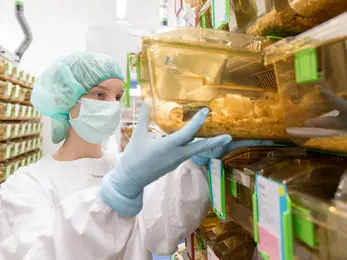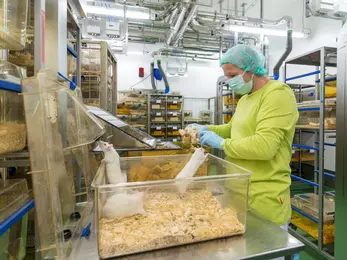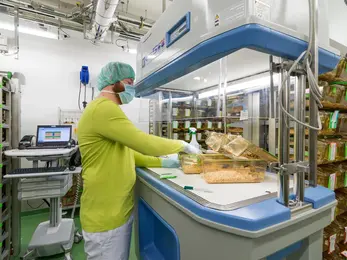Zentrum für Präklinische Forschung (ZPF)
Dr. Annalena Riedasch

Krebserkrankungen stellen nicht nur für Betroffene und Angehörige eine große Belastung dar, sondern sind auch ein zentrales gesundheitspolitisches Thema. Am DKFZ erforschen Wissenschaftler:innen die molekularen Grundlagen von Krebs sowie neue Ansätze zur Diagnostik und Therapie. Dabei kommen möglichst tierversuchsfreie Methoden wie Zellkulturen, Organoide und Computersimulationen zum Einsatz. Da Krebs jedoch den ganzen Organismus betrifft, sind Tierversuche in bestimmten Bereichen weiterhin notwendig. Diese werden nach dem 3R-Prinzip (Replacement, Reduction, Refinement) durchgeführt, um das Tierwohl zu wahren. Im Fokus stehen dabei vor allem genetisch veränderte Mäuse sowie Modelle mit eingeschränktem Immunsystem zur Übertragung menschlicher Tumorzellen.
Sämtliche Tierversuche unterliegen strengen gesetzlichen Vorgaben und Kontrollen. Das Zentrale Tierlabor (ZTL) sorgt mit einem erfahrenen Team aus Tierpflegenden, Tierärzt:innen und Verwaltung für eine tierschutzgerechte Haltung der Tiere. Die Tierpfleger:innen übernehmen die tägliche Betreuung, kontrollieren den Gesundheitszustand, achten auf Futter- und Wasseraufnahme, beobachten das Verhalten der Tiere und dokumentieren Auffälligkeiten. Durch ihre Erfahrung und Aufmerksamkeit tragen sie wesentlich dazu bei, das Wohlergehen der Tiere sicherzustellen und gleichzeitig die wissenschaftliche Aussagekraft der Studien zu gewährleisten. Tierschutzbeauftragte unterstützen die Forschenden bei der Planung und Durchführung ihrer Experimente. Das Diagnostiklabor überwacht regelmäßig den Gesundheitsstatus der Tiere. Die Transgeneinheit entwickelt individuelle Mausmodelle und sichert wichtige genetische Linien durch Kryokonservierung. Ergänzend führt die Einheit Tumormodelle Studien mit Tumorzelltransfers und krebsauslösenden Substanzen durch, auch im Rahmen von Diät- und Therapietests.
Im weiteren Verlauf der Seite finden Sie mehr Informationen zu den jeweiligen Schwerpunkten.
Seit 2023 ist das DKFZ Mitglied der Initiative “Transparente Tierversuche”

Das ZPF setzt sich zusammen aus:
Die Mitarbeitenden des Zentralen Tierlabors (ZTL) züchten und halten Versuchstiere für die Arbeitsgruppen des DKFZ. Neben Ratten (Rattus norvegicus), Meerschweinchen (Cavia porcellus), Vielzitzenmäusen (Mastomys coucha) und Amphibien (Xenopus spp.) handelt es sich im Wesentlichen um Mäuse (Mus musculus), die gentechnisch verändert, eine herausragende Rolle in der Krebsforschung spielen.
Ein auf Versuchstierkunde spezialisiertes Team von klinischen Tierärzten leitet die Tierhaltung. Überwiegend im eigenen Haus ausgebildete Tierpfleger versorgen in Teams jeweils spezifische Tiergruppen. Die hausinterne Ausbildung und ständige Fortbildungsmaßnahmen sind die Basis für eine optimale Qualifikation des Tierpflegepersonals. Eine enge und konstruktive Kooperation zwischen Tierärzten, Tierpflegern und Wissenschaftlern gewährleistet nicht nur eine den gesetzlichen Anforderungen entsprechende Unterbringung was Platzbedarf, Temperatur, Luftfeuchte, Enrichment etc. angeht, sondern sorgt zudem für eine Minimierung versuchsbedingter Belastungen der Tiere. Zur Dokumentation der Zuchten, wobei alle in der Versuchstierkunde üblichen Zuchtverfahren praktiziert werden, wird eine spezielle Software eingesetzt. Dies stellt eine adäquate Transparenz für alle Beteiligten her.
Tiere, die frei von Krankheitserregern (Pathogenen) sind, werden nicht nur aus Tierschutzgründen gefordert. Für die Erarbeitung aussagekräftiger Versuchsergebnisse sind gesunde Tiere eine absolut notwendige Voraussetzung. Der sogenannte „spezifisch Pathogen freie“ (SPF) Status wird durch eine Tierhaltung in speziellen Bereichen (Barrieren) und/oder in einzelbelüfteten Käfigen (IVC) erreicht und durch eine enge Kooperation mit Mitarbeitern der Einheit „Mikrobiologische Diagnostik“ regelmäßig nach internationalen Richtlinien überwacht. Mit diesen Kontrollen gelingt es, Tiere mit einer optimalen mikrobiologischen Qualität zur Verfügung zu stellen. Im Rahmen von Importen werden immer wieder Aufreinigungen von Mausstämmen, die mit störenden pathogenen Mikroorganismen befallen sind, erforderlich. Die Befreiung des Tierstammes von solchem Befall, eine sogenannte Hygiene-Sanierung wird routinemäßig zur Qualitätssteigerung durchgeführt, und zwar durch Embryotransfer. Hierbei werden wenige Tage alte Mausembryonen aus mikrobiologisch kontaminierten Spenderinnen entnommen und auf Empfängerinnen mit SPF-Hygieneniveau übertragen. Sie werden samt ihrer Jungtiere in Isolatoren gehalten und intensiv mikrobiologisch untersucht, bevor deren Überführung in einen SPF-Haltungsbereich erfolgen kann.
Um genetische Veränderungen in Tumoren des Menschen nachzustellen, werden in der Forschung Mausmodelle etabliert, die ein oder auch mehrere Gene in veränderter Form als Transgene oder knock-out Allele in einem hoch ingezüchteten und damit genetisch hoch standardisierten Hintergrund tragen. Um Inzuchtstämme noch besser auf ihre Authentizität hin zu überprüfen, wird aktuell ein Programm zur systematischen Analyse einer Reihe von Einzelnukleotid-Polymorphismen (engl. Single Nucleotide Polymorphisms, SNPs) eingeführt.
Das Deutsche Krebsforschungszentrum hat ein modernes Tierhaus eingerichtet und arbeitet eng mit den Tierschutzbehörden zusammen. Unsere Wissenschaftler setzen auf die 3R Regel: Wir führen so wenig Tierversuche wie möglich durch (Reduction), wir versuchen, sie durch stetige Weiterentwicklung zu verbessern (Refinement) und, wenn es möglich erscheint, durch Alternativen zu ersetzen (Replacement). Eine so komplexe Krankheit wie Krebs, die den ganzen Körper betrifft, wird sich allerdings nie vollständig am Bildschirm oder in der Kulturschale darstellen lassen. Insofern unterstützen wir die Einrichtung der gemeinsamen Initiative der Allianz der Wissenschaften „Tierversuche verstehen", die über Tierversuche in der Forschung informieren möchte. Hier finden Sie die Seiten von Tierversuche-Verstehen.
Bösartige Tumoren sind Gewebe mit komplexem Phänotyp, die in einem langwierigen Prozess aus einer normalen Zelle schrittweise entstehen. Treibende Kräfte der Tumorentwicklung sind die progressive Anhäufung von genetischen und epigenetischen DNA-Veränderungen. Dadurch bedingte Beeinträchtigungen zellulärer Signalwege und Schaltkreise verschaffen der jeweils betroffenen Zelle Wachstumsvorteile in ihrer unmittelbaren Umgebung und gegenüber dem Immunsystem. Damit einhergehend werden neue Gefäße gebildet und Entzündungsreaktionen im umgebenden Stützgewebe ausgelöst Komplexe Interaktionen zwischen Tumor- und Gefäß-, Immun- oder Stromazellen sind bisher in Zellkultur-Systemen nicht authentisch nachvollziehbar. In vivo Tumormodelle, seien es genetisch manipulierte Mauslinien oder Heterograftmäuse, sind daher als Instrumente für die Erforschung der molekularen und zellulären Grundlagen der Tumorentwicklung als auch für translationale Applikationen für die Krebsforschung unverzichtbar.
Die Core Facility "Tumormodelle" bietet Expertise sowie spezifische Einrichtungen und Ressourcen an, um die Planung, Durchführung und Auswertung von Tierversuchen in anerkannten in vivo Entzündungs- und Tumormodellen nach State-of-the-Art-Protokollen und geltendem Recht effizient und erfolgreich mit Ihnen zu gestalten.
Die Aufgaben werden teils im Vollservice und teils im unterstützten Service erfüllt. Letzteres impliziert ein Training von beteiligten Experimentatoren insbesondere bei der geplanten Verabreichung von Karzinogenen und reizenden Substanzen. Das Angebot an Modellen wird sich ändernden Forschungsbedürfnissen anpassen.
Aussagekräftige wissenschaftliche Ergebnisse lassen sich nur dann mit einem Minimum an Versuchstieren erzielen, wenn die Tiere frei sind von Krankheitserregern, die die Versuchsergebnisse verfälschen können. Mikrobiologisch standardisierte Tiere sind eine Voraussetzung, um Tierversuche auf das gesetzlich vorgeschriebene „unerlässliche Maß“ zu beschränken. Aufgabe des Bereiches Mikrobiologische Diagnostik ist es, zu verhindern, dass schädliche Mikroorganismen in die Tierhaltung des Krebsforschungszentrums eingeschleppt werden und sicherzustellen, dass die im zentralen Tierlabor gehaltenen Tiere frei von Infektionen und Parasiten sind. Auch biologische Materialien, die in Experimenten verwendet werden, wie z.B. Zellen, Tumorproben oder Seren, werden auf Verunreinigungen mit Bakterien, Pilzen und Viren untersucht, bevor sie für Experimente verwendet werden.
Die Einheit Transgen Service unterstützt Wissenschaftler im DKFZ bei der Herstellung genetisch veränderter (transgener) Mauslinien. Dabei werden DNA-Sequenzen in das Erbgut der Tiere übertragen oder endogene Sequenzen verändert. Je nach wissenschaftlicher Fragestellung kann das eingefügte Gen in ein funktionelles Protein übersetzt, oder ein bestimmtes Gen des Empfängertieres kann verändert oder stillgelegt werden.
Weitere Informationen finden Sie auf den Seiten des Transgen Service:
Das Tierschutzgesetz §10 schreibt vor, dass Träger von Einrichtungen, in denen Tierversuche an Wirbeltieren durchgeführt werden, einen oder mehrere Tierschutzbeauftragte (TSB) zu bestellen haben. Die Aufgaben der Tierschutzbeauftragten sind in der Tierschutzversuchstierverordnung (§5) definiert.
Die Tierschutzbeauftragten sind in allen Fragen zum Tierschutz und zur Versuchstierkunde die ersten Ansprechpartner für die Mitarbeitenden des DKFZ. Sie sind der Mittler zwischen den tierexperimentell tätigen Wissenschaftler:innen und der Behörde. Sie sollen in kollegialer Weise durch ihre Beratung und Stellungnahmen dafür sorgen, dass die Mitarbeitenden der Einrichtung zu tierschutzgerechtem Handeln angehalten werden und dass im Zentrum eine Kultur der Fürsorge (Culture of Care) ensteht.
Der DKFZ-Tierschutzausschuss vereint Tierschutz, Tierpflege und Tiernutzung, um das Wohlergehen der Versuchstiere am DKFZ stetig zu verbessern und dadurch eine verantwortungsvolle Kultur der Fürsorge (culture of care) zu implementieren.
Der Ausschuss setzt sich aus Tierpflegepersonal, tierärztlichem und wissenschaftlichem Personal und der Compliance-Bauftragten des DKFZ zusammen. Die Notwendigkeit des Tierschutzausschusses und dessen Aufgaben basieren auf §6 der Tierschutzversuchstierverordnung und können der Satzung entnommen werden, die vom Vorstand unterzeichnet wurde. Hierzu gehören u.a. die Unterstützung der Tierschutzbeauftragten, die Verfolgung der Entwicklung von Tierversuchen, sowie deren Ergebnisse und die Beratung aller Personen am DKFZ, die mit Versuchstieren arbeiten, hinsichtlich der Beschränkung von Schmerzen, Leiden, Schäden auf das unerlässliche Maß, der Verbesserung der Haltung, Zucht und Pflege von Versuchstieren, der Überprüfung, ob Alternativen zum Tierversuch zur Verfügung stehen und der Beschränkung der Versuchstierzahl auf das unerlässliche Maß.
Information und Training
- LAS interactive
- Humane Endpunkte in tierexperimentellen Studien
- Procedures With Care
- GV-Solas: hilfreiche Informationen
Tierversuche und Alternativen zum Tierversuch (3R: replace - reduce - refine)
- Das Deutsche Zentrum zum Schutz von Versuchstieren Bf3R
- Initiative Transparente Tierversuche (DKFZ ist Mitglied)
- Tierversuche verstehen - Eine Informationsinitiative der Wissenschaft
- Empfehlungen des Nationalen Ausschusses (TierSchG)
- NC3Rs National Centre for Replacement, Refinement & Reduction in UK
- ALTEX - Alternatives to Animal Experimentation
- Europäische Kommission und 3R
Preise und Förderungsmöglichkeiten im Bereich der 3R
(Inter)nationale versuchstierkundliche Gesellschaften
- GV-Solas: Gesellschaft für Versuchstierkunde
- FELASA: Federation of European Laboratory Animal Science Associations
- ICLAS: International Council for Laboratory Animal Science
- AALAS: The American Association for Laboratory Animal Science
- LASA: The Laboratory Animal Science Association, UK
weitere wichtige Organisationen
+++
Der internationale Tag des Versuchstieres am 24. April 2022: Presseveranstaltung am DKFZ und gemeinsame Besichtigung der Tierhaltung
Das DKFZ hat den internationalen Tag des Versuchstiers am 24. April zum Anlass genommen, um bei einer Presseveranstaltung über Tierversuche zu informieren.
Wie unverzichtbar Tierversuche in der Krebsforschung derzeit sind, verdeutlichten Prof. Matthias Heikenwälder und PD Angelika Riemer an ausgewählten Forschungsprojekten. Dr. Annalena Riedasch, Tierärztin im Zentrum für präklinische Forschung und Leiterin des Tierschutzausschusses am DKFZ, erläuterte, wie die Tiere nach den höchsten Tierschutzstandards weltweit im DKFZ gehalten und wie Tierversuche angewendet werden. Auch ein Besuch des zentralen Tierlabors stand bei dem Pressetermin auf dem Programm.
Zu dem Thema berichtet unter anderem die Frankfurter Allgemeine Zeitung, die regionalen Zeitungen RNZ und Mannheimer Morgen sowie der SWR.
+++
Veranstaltungen und Öffentlichkeitsarbeit “Science in the City”
Am 19.2.2022 konnten sich die Heidelberger in der Altstadt bei der Veranstaltung "Science in the City" über Tierversuche informieren. In einem sogenannten Pop-up Store standen Mitarbeiter:innen des ZPFs mit Bildern, Materialien, Käfigen und Postern für die interessierte Bevölkerung einen Tag lang Rede und Antwort zu dem schwierigen Thema Tierversuche. Theresia Bauer, zu diesem Zeitpunkt Ministerin für Wissenschaft, Forschung und Kunst sowie die Landtagsabgeordnete Susanne Aschhoff besuchten gemeinsam mit Michael Baumann den Pop-up Store und informierten sich über die Tierhaltung am DKFZ, sowie über die Notwendigkeit von Tierversuchen in der Krebsforschung.
Lust auf Verantwortung? WIR SUCHEN DICH!
Interesse an dem Beruf Tierpfleger:in Forschung und Klinik? HIER KLICKEN

Kontaktieren Sie uns



